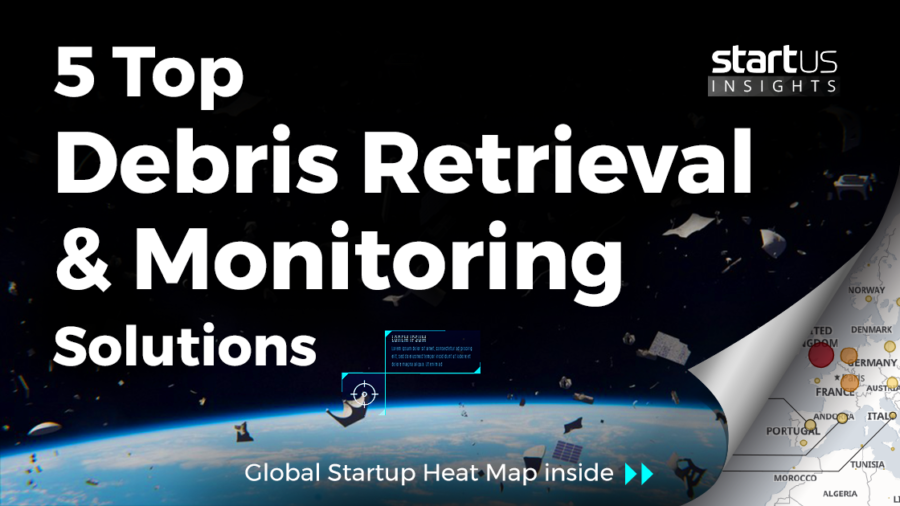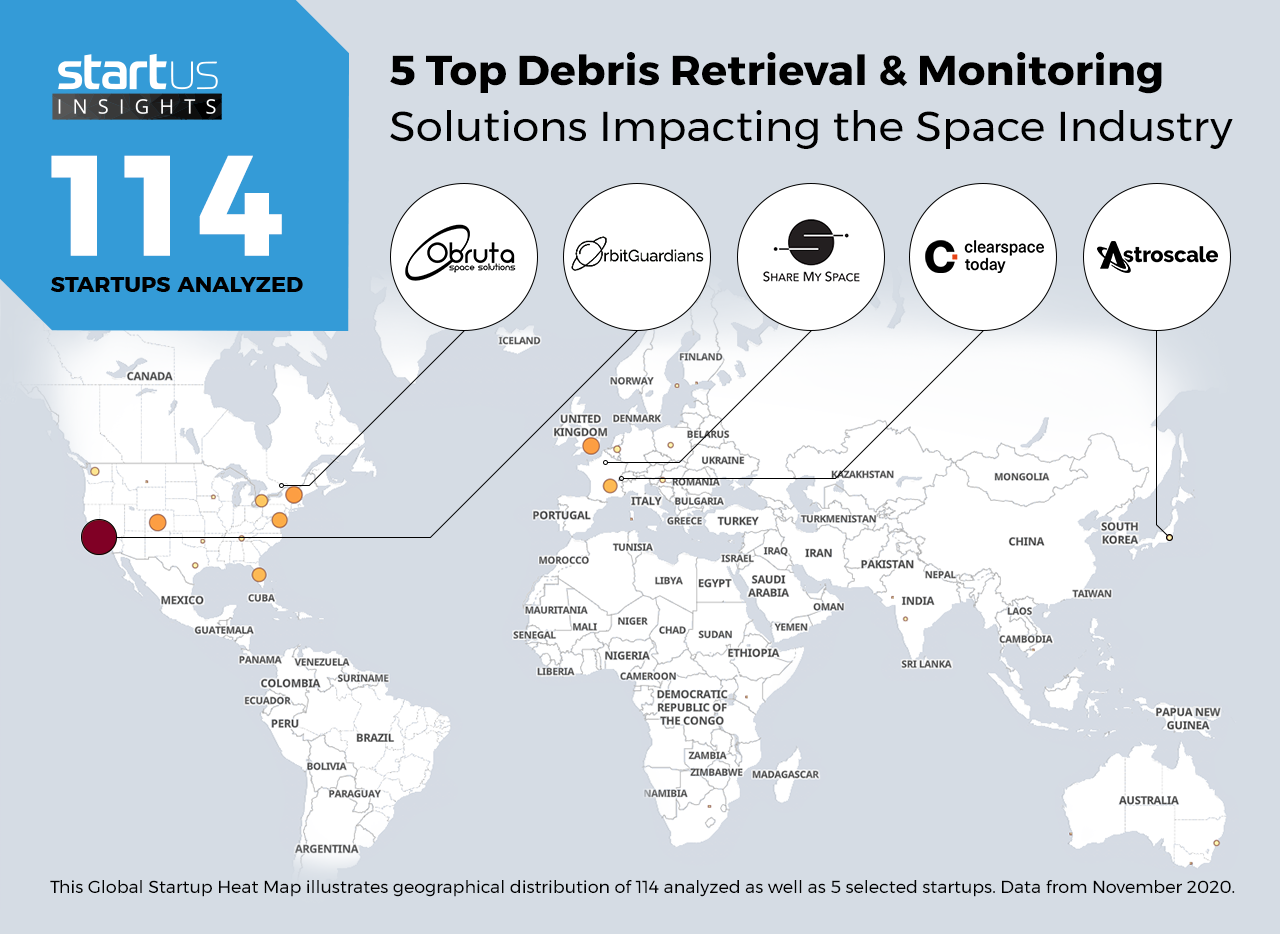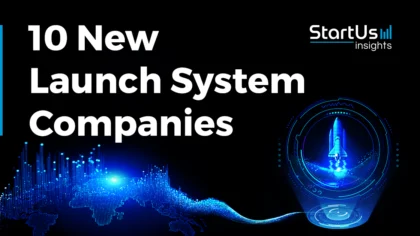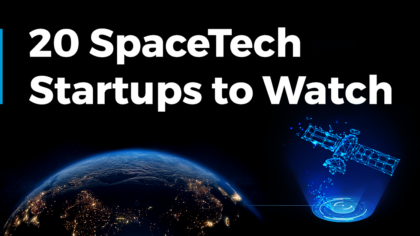Our Innovation Analysts recently looked into emerging technologies and up-and-coming startups working on innovative solutions for the space industry. As there is a large number of startups working on a wide variety of solutions, we want to share our insights with you. This time, you will discover 5 promising space debris retrieval and monitoring solutions.
Global Startup Heat Map highlights 5 out of 114 Space Debris Solutions
Through the Big Data & Artificial Intelligence (AI)-powered StartUs Insights Discovery Platform, covering over 3 790 000+ startups & scaleups globally, we identified 114 space debris removal companies & startups. The Global Startup Heat Map below highlights the 10 space debris startups you should watch as well as the geo-distribution of all 114 startups & scaleups we analyzed for this research.
Based on the heat map, we see high startup activity in the US, followed by Europe. These space debris removal startups work on solutions ranging from monitoring and retrieval to in-orbit services and software.
5 Top Space Debris Solutions for Removal & Monitoring
OrbitGuardians – Low-Cost Active Debris Removal (LCADR)
Kessler syndrome is a hypothesized scenario where collisions in Earth’s orbit will generate more debris. To prevent this, there is a high necessity to monitor and remove the active debris currently in space. Emerging space technology companies are working on solutions to tackle this major threat to space exploration.
The US-based startup OrbitGuardians is a commercial provider of active debris removal services. It combines computer vision, artificial intelligence (AI), and the Internet of Things (IoT) for low-cost active debris removal. The startup also leverages IoT and AI to acquire debris parameters and eliminate potentially dangerous targets. By removing dangerous space debris smaller than 20 cm, it aims to protect space workers, space tourists, and operating satellites.
ClearSpace – Space Debris Removal
Of all the man-made satellites in low Earth orbit (LEO), 95% are space junk. This includes rocket thrusters, derelict satellites, and most of all, tiny fragments of debris from collisions and explosions. All this debris poses a potential threat to the future of space travel. This situation encourages emerging startups to invest in and develop feasible solutions for space debris removal.
ClearSpace, a spin-off from the Swiss EPFL Space Center, develops technologies to remove unresponsive or derelict satellites from space. ClearSpace One, the startup’s small satellite solution, finds, captures, and removes man-made space debris repeatedly. As for an expected timeframe, the startup plans to remove the first pieces of debris from space by 2025.
Share My Space – Space Debris Monitoring
As of 2019, there were over 900 000 space debris between 1 and 10 cm large in Earth’s orbit. These endanger more than 2000 operational satellites. Hence, space companies develop new methods, techniques, and warning systems to tackle the issue of debris in space. For example, space debris monitoring provides timely alerts and warnings to astronauts and space vessels in proximity.
French startup Share My Space offers a collision warning service based on astronomy observations and deep learning algorithms. The startup creates multiple solutions to tackle the challenge.
First, INDEMN predicts the risk related to on-orbit collisions. Second, CALM enables satellite operators to respond to collision warning messages automatically. Third, DRYADE helps with systematic on-orbit space debris collection based on bio-mimicry.
By integrating heterogeneous data sources, such as lasers mounted on telescopes, the startup improves the accuracy of debris monitoring.
Astroscale – On-Orbit Servicing
With the ever-growing amount of debris in space, on-orbit servicing and active debris removal have become essential. For this purpose, satellites are actively being used to remove large debris from space. Such satellites observe, characterize, and eventually remove debris to secure safe and sustainable orbits for future satellites.
Japanese startup Astroscale removes orbital debris through the provision of End of Life (EOL) and Active Debris Removal (ADR) services. In addition to providing technical solutions, Astroscale defines the business case for its services. It works with national space agencies, international institutions, non-profit organizations, insurance companies, and satellite operators.
In collaboration with the Japan Aerospace Exploration Agency (JAXA), it is working on the removal of a Japanese rocket body. The startup’s work advances norms, regulations, and incentives that contribute to the responsible use of space.
Obruta – Tethered-Net Removal Technology
Novel methods to remove the active debris in space for humans to sustainably occupy the orbital space are the need of the hour. One such method is the tethered-net removal technology, widely used in debris monitoring. The net capture system relies on deployment masses that accelerate during net deployment in order to move a net out of a container and to inflate the net on the way to its target object. After capture, the net is wrapped around the target and establishes a tether line connection to the service spacecraft.
Based in the US, startup Obruta meets the growing concerns around the safety, removal, and future mitigation of all space debris. The startup tackles the immediate threat of space debris through active tethered-net removal technology and end-of-life deployable deorbiting systems.
To enable humans to occupy space in a sustainable manner, Obruta is developing the Puck, a device to end the single-use paradigm of spacecraft. By enabling refueling amongst other features, the Puck allows all satellites to extend their lifespans while aiding in their eventual removal.
Discover All Space Debris Startups
The SpaceTech startups showcased in this report are only a small sample of all startups we identified through our data-driven startup scouting approach. Download our free SpaceTech Innovation Report for a broad overview of the industry or get in touch for quick & exhaustive research on the latest technologies & emerging solutions that will impact your company!







